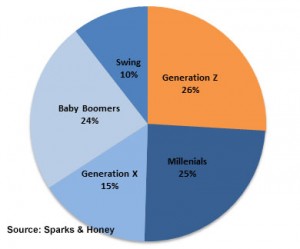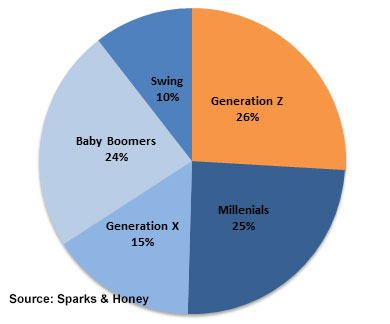 Just when you got used to leading millennials, the game is getting ready to change again. Gen Z (currently comprised of 3 to 20 year olds) may seem like “just kids” to you now, but they’ll be applying for openings on your team before you know it. Gen Z now accounts for about 7% of the workplace and by 2019 there will be 30 million employed members of Gen Z. Companies are already strategizing how to attract this new talent pool, so you need to start thinking about how you’ll lead this unique demographic. As with every generation, Gen Z is bound together by a set of common experiences and expectations that drive their behaviors. Those behaviors may be a benefit or challenge in the workplace depending on how you react to them. The biggest mistake you can make is to treat Gen Z like Millenials. In fact, in many ways, their wants and desires are either the opposite or an extreme version of what you’ve experienced with Gen Y. Here are a few things you can expect from the next generation of workers:
Just when you got used to leading millennials, the game is getting ready to change again. Gen Z (currently comprised of 3 to 20 year olds) may seem like “just kids” to you now, but they’ll be applying for openings on your team before you know it. Gen Z now accounts for about 7% of the workplace and by 2019 there will be 30 million employed members of Gen Z. Companies are already strategizing how to attract this new talent pool, so you need to start thinking about how you’ll lead this unique demographic. As with every generation, Gen Z is bound together by a set of common experiences and expectations that drive their behaviors. Those behaviors may be a benefit or challenge in the workplace depending on how you react to them. The biggest mistake you can make is to treat Gen Z like Millenials. In fact, in many ways, their wants and desires are either the opposite or an extreme version of what you’ve experienced with Gen Y. Here are a few things you can expect from the next generation of workers:
They are Tech Innate. Millenials have often been referred to as Digital Natives, meaning that they grew up in a time when technology rapidly evolved and became widely available to all ages. During their formative years, they had access to computers and cell phones and as a result, they never feared the use of technology. Learning new tech was comfortable for them. Gen Z, however, has never known anything but technology. They read books on a Kindle and designed their Barbie Dream House on an iPad while in elementary school. They weren’t issued textbooks in high school, they were issued Chromebooks. They will expect you to communicate with them via technology whenever possible. But unlike Millenials who prefer text-based communication, Gen Z will prefer visual communication via photos or videos.
They’re creators. Whereas Millenials grew up watching YouTube videos for entertainment, Gen Z grew up making YouTube videos to share with others. They are content creators and believe in the value of sharing with everyone. Strong leaders will harness this creative energy and drive to make things better while also training Gen Z about the reality of proprietary information and corporate competition.
They’re born entrepreneurs. Currently, 3% of Gen Z already owns their own business. This is unprecedented. When Gen Z wanted to make some money, they didn’t open a lemonade stand or mow their neighbors grass, they built apps and websites. They took payments for homemade goods using a Square reader on their smart phone. How did they develop such an entrepreneurial spirit? Their parents have pressured and supported them to focus on professions instead of just an education. Their Gen Y parents may still be paying off student loan debt themselves and aren’t as quick to push the traditional University route with their Gen Z children. As a result, Gen Z is more proactively considering what they want to be at an early age.
They want diversity. They will not only tolerate diversity, they will expect and demand it. Gen Z is growing up in a time when families are blended, race and ethnicity lines have blurred, and what used to be considered “non-traditional” is now the “new normal.” Yes, you’ll still need diversity training for all employees, but your Gen Z team members will embrace and expect individuals with diverse backgrounds to be a key part of their future. You should also expect Gen Z to challenge traditional gender roles. It is critical that you address unconscious forms of gender bias that may be present in your organization.
They will need clear instructions. Gen Z grew up in a time where high stakes standardized testing influenced the way teachers planned their curriculum. Gen Z didn’t just take tests. They were told what would be on the test, and focused nearly exclusively on that content. If It wasn’t on the test, it didn’t matter. Now imagine how that will translate into performance appraisals in the workplace. Gen Z will want clear instructions about what they need to do, how they need to do it, and how they will be assessed because that is how they were taught. You will need to set expectations and define what success looks like early on.
They expect instant gratification. When Gen Z had trouble with their homework, they didn’t ask their parents for help, go to the library, or wait until the next day to ask the teacher. They Googled it. They went to KhanAcademy.org. They checked out YouTube tutorials. They crowdsourced the problem on Facebook, Twitter, and Snapchat. When Gen Z has a question, they expect answers and they’re resourceful enough to find them on their own. If you can’t be available to your Gen Z employees to answer questions quickly, you’ll need to train them on where to go for accurate answers to their questions. But also, be open to letting them find answers on their own. The data they surface from hidden corners of the Internet may surprise you.
They’ll expect rewards. There are many jokes about Gen Z being the trophy generation where every participant in a sport or activity receives a trophy (not just the winner). But the reality is, this expectation for rewards will carry over into the workplace as well. Boomer leaders who believe a paycheck is a satisfactory reward for a satisfactory job will have a hard time retaining Gen Z talent.
While Gen Z is considered to be the most researched generation in history, we are still just learning about this unique generation and forecasting the impact they will have on the workplace. Whether we’re ready for the challenge of a new generation in the workplace or not, here they come!

